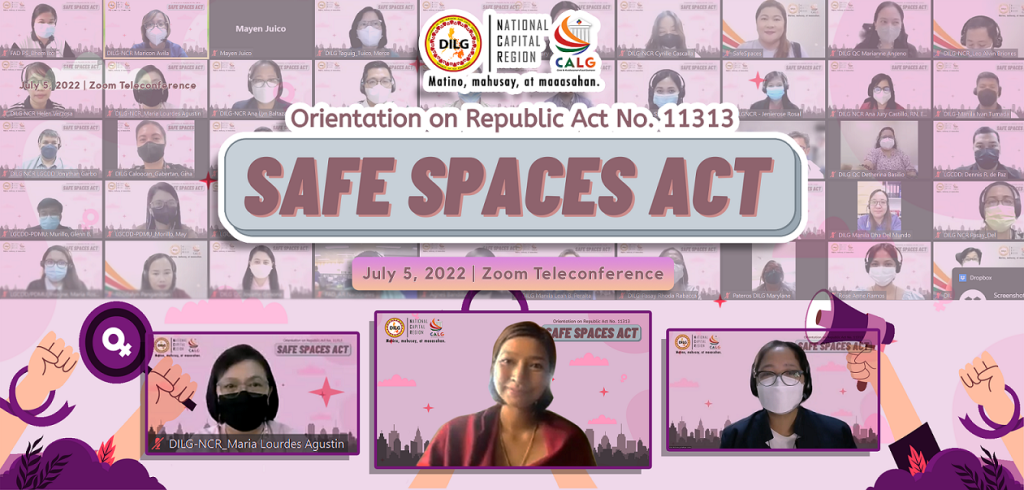
The Center for the Advancement of Local Governance (CALG), through its Capacity Development (CapDev) Facility, conducted an orientation on Republic Act No. 11313, otherwise known as the Safe Spaces Act, for DILG-NCR personnel on July 5, 2022, via Zoom.
Invited as principal resource person in the orientation was Ms. Lena Marie P. Juico, a noted advocate of women’s rights and gender equality and former Quezon City Councilor who served for 9 years in the city council. Ms. Juico introduced the Bawal Bastos Ordinance in Quezon City which was passed in 2016.
The above ordinance codified existing ordinances and statutes related to Violence Against Women, Sexual Abuse, Reproductive Health, and Gender Equality, among others. The ordinance is predicated on the United Nations (UN) program on Gender Equality, particularly in reference to its Safe Cities Free of Violence component which addresses the safety of women in public spaces.
The Bawal Bastos Ordinance expanded the scope of the Anti-Sexual Harassment Act of 1995 by encompassing what counts as (and who are deemed involved in) acts of sexual harassment, strengthening administrative mechanisms in the workplace, instituting penalties for acts of harassment, and codifying the obligations, duties, and liabilities of institutions where the acts of harassment take place.
Among punishable acts enumerated in the ordinance are behaviors such as: catcalling, wolf-whistling, persistent asking for dates or numbers despite having been rejected, calling people names with dirty connotations, use of misogynistic and sexist language, and the like.
The ordinance also calls for the creation of an ad hoc Committee on Decorum and Investigation (CODI) which receives and hears complaints submitted by victims or aggrieved parties.
Ms. Juico went on to discuss the takeaways from the cases of sexual harassment handled by the Quezon City Government and the continuing challenges that stand in the full and effective implementation of the Bawal Bastos Ordinance.
In her message, Regional Director Maria Lourdes L. Agustin, CESO III highlighted the importance of holding such orientations and trainings related to the Safe Spaces Act. Further, she cited RA 11313 obligating institutions, workplaces, and similar settings to put policies and other initiatives into place to avoid cases of Gender-Based Sexual Harassment.
At the end of the activity, Assistant Regional Director Atty. Ana Lyn R. Baltazar-Cortez, CESO V, cited Quezon City’s Bawal Bastos Ordinance as the benchmark legislation that other LGUs might adopt in passing sexual harassment ordinances of their own. ARD Baltazar-Cortez noted that Quezon City was the first LGU to establish centers for the protection of children, women, and members of the LBGTQ+ community, an initiative that deserves emulation by other LGUs.
For its part, DILG-NCR continues to be an organization that is gender-sensitive and committed to creating a workplace that is safe for everyone, ARD Baltazar-Cortez assures the personnel, as she urges everyone to be advocates for the learnings gleaned from the day’s activities.
